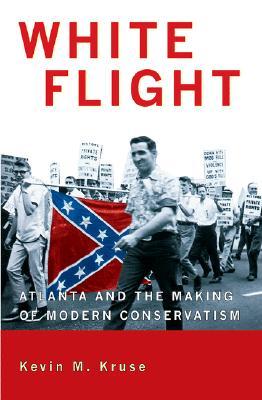A friend who sells high-end real estate tells the story of a well-heeled Northern couple who were enchanted by the idea of owning an antebellum Southern mansion. He met them at the airport and took them to one of our charming old South Carolina towns—one that, having failed to be liberated by the U.S. Army in 1864-65, contained several attractive properties. Scarcely had they arrived, however, when the two demanded to be taken back to the airport. It was evident that the sight of large numbers of black Carolinians in the streets, going about their work and leisure, had led to rapid disenchantment on the part of our prospective citizens.
This is not exactly what Kevin Kruse means by white flight. He has in mind those evil Southerners who have fled Atlanta in recent decades rather than stand and fulfill what he considers their moral duty: Stay behind in pursuit of Kruse’s commonplace yet fantastical daydream of egalitarian paradise. High taxes, crime, corruption, and nonfunctional schools seem to the author a small price for others to pay for the realization of his desideratum. Yet most people will sympathize with those in flight, even if they have created the endless nightmare of suburban congestion that is a damned nuisance for anyone trying to get past Atlanta to some civilized place like Forsyth or Macon. Of course, when Southerners do something bad, they are simply confirming their evil, America-contaminating nature, which is a well-known fact of the universe. Never mind that Georgians in white flight were only doing what Northerners had been doing for 50 years or more with less provocation. (The minority metropolitan-area population for larger Northern cities is 10 percent, compared with Atlanta’s 35.)
White Flight does present some interesting history of Atlanta politics during the Civil Rights Era and since—the rocky path ascending from Southern benightedness to the glowing virtue of true American urbanism. Of course, what really happened was the takeover of the city by an unholy collusion of unscrupulous “leaders” of the black community with unscrupulous rent-seeking businessmen speculating in public subsidy. Come to think of it, Atlanta has become a true American city after all—though not, of course, the American city as fantasized in the daydreams of egalitarian utopia.
This is a book written for liberal daydreamers to tell them what they ought to think about Atlanta. These people, it seems, mistakenly honor Atlanta as a model for the success of “civil rights” and black enfranchisement. Liberal right-thinkers should be warned that there is another side to the story. The real lesson lies not in the much-celebrated defeat of segregation but in the massive flight of middle-class whites to the suburbs. Actually, this is news to no one except a daydreaming liberal. White flight has simply become the established, though unofficial, American way. The purpose of presenting this non-news as a fresh discovery is to give liberals a comforting explanation for the electoral strength of “conservative” Republicanism. It is obviously a product of the suburbanization that is a direct result of the “racism” that caused middle-class whites to flee, rather than remain behind in the city to create the reign of loving brotherhood that would certainly have ensued but for their cruel abandonment of the unfortunate. Instead of realizing the author’s utopia, they cut and ran. Worst of all, perhaps, they became Republican voters.
Kruse’s scenario is plausible only to those who believe that it is somehow a triumph of “conservatism” for Southern voters to have been co-opted into support of the national Republicans’ strange brew of state capitalism, imperialism, Christian Zionism, and police-state tendencies. But that is another story for another day.
[White Flight: Atlanta and the Making of Modern Conservatism, by Kevin M. Kruse (Princeton: Princeton University Press) 325 pp., $35.00]

Leave a Reply